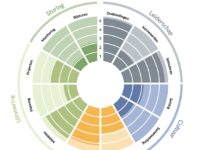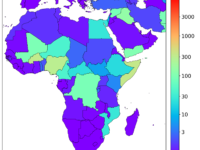The innovation addresses bullying in schools. How to report it and how to follow it. The innovation is a tool on how to report bullying quickly and react to it effectively. Also on how to follow up and analyze data regarding bullying. The innovation lies in the use of existing tools within Google Workspace for Education and on how to use digital tools to identify and react to bullying. Many schools use Google Workspace for Education, so the innovation does not require any further investment.
Innovation Tag: Methods and Tools
The Ukraine war established a commitment to work across sectors to improve digital services to refugees. Focus on end user needs and an unbureaucratic organizational model have produced tangible results such as:
Better update of address information in national register
Electronic identification - access to digital services
Twelve agencies worked with obstacles and bottlenecks in the refugee's user journey, with the objective of good transitions between services.
Discovery as a Service (DaaS) enables successful delivery of UK Policing Technology through standardised and outcome based discoveries to provide evidence and overcome inconsistency in project initiation. By employing user centric thinking, agile delivery, innovation, and multi-disciplinary teams, DaaS ensures new national technology initiatives provide beneficial capabilities to UK Law Enforcement so they safeguard the UK public. This service is the first of its kind in the Home Office.
Officina is a lab for innovation in the public sector whose main objective is to catalyse the energy of young talents by offering them a transformative training programme. Officina was developed to address a triple urgency: future decision makers not perceiving the public sector as an attractive workplace; the public sector having high average age workforce and lack of innovative approaches; society at large needing a more modern and appealing public sector in this key historical moment.
A lot of innovative activities are carried out by Dutch and other governments. Unfortunately, the impact is limited. Innovations are stand alone projects, not implemented or scalable within primary processes. This reference model supports the implementation of an innovation management system for governments. The starting point is an Innovation Maturity Scan. Tooling, training and handouts are available supporting a social and process innovation transition at governmental organizations.
The Violence Early-Warning System (ViEWS) is a publicly available data-driven forecasting system at the frontier of research that generates monthly predictions of conflict fatalities up to 36 months ahead – throughout Africa and the Middle East. The project launched in 2017 to help policy-makers and practitioners plan anticipatory action and humanitarian interventions with a transparent and evidence-based approach. It is based at Uppsala University and Peace Research Institute Oslo.
Case Study
‘Con Vos’ Network: Digitalization for Effective Governance. Community Markets to Improve Access…

When applying for state aid or other services without the means or knowledge to do it online due to the digital gap, it usually takes a day or waiting in queues and filling out paperwork. Communities have thought and offered a grassroot solution: store owners helping their peers to get online procedures done in their business, in exchange for a small fee. It is a simple innovation, yet effective when it comes to decentralize public services, foster digital inclusion, and strengthen local markets
The rate of innovation often exceeds the speed at which regulatory systems can adapt, blurring lines between sectors and cutting across transitional regulatory and geographical boundaries. The RPF aims to keep the UK at the forefront of regulatory thinking and experimentation. It sponsors projects, led by regulators, aiming to help create a UK regulatory environment that encourages business innovation and investment. It is market-led and uses real-world innovation settings to deliver.
With the Quality Tools an organisation can evaluate, monitor and compare the quality and use of its services within and between organisations. The tools include a Self-assessment, Customer Feedback and Utilisation Rate Measurement tool and are free of charge. The tools were developed primarily for public sector organisations to help them develop customer-oriented digital services and improve knowledge-based management. On a national level the tools provide data on the state of digitalisation.
How to bring new ways of working and problem-solving tools to the Estonian public sector? Over the course of a year and a half the Public Sector Innovation Team of Estonia developed a design sprint format suitable for the Estonian public sector. By constantly adapting and improving the format the Innovation Team has seen that it is a highly effective tool for spreading design thinking methods and generating enthusiasm around them.



